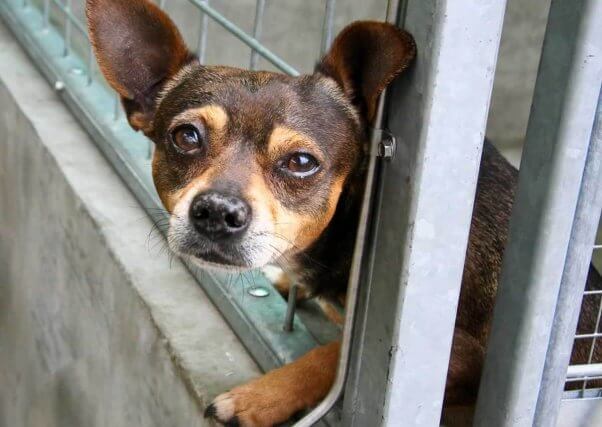Linda Mcnatt Animal Care & Adoption Center
Not all animal shelters are the same. Fortunate homeless and unwanted animals end up in the hundreds of open-admission animal shelters that are staffed by professional, caring people.
At these facilities, frightened animals are reassured, sick and injured animals receive treatment or a peaceful end to their suffering, and the animals' living quarters are kept clean and dry. Workers at these facilities never turn away needy animals and give careful consideration to each animal's special emotional and physical needs.
 © iStock.com/Story-Stock
© iStock.com/Story-Stock
To be able to offer refuge to every animal in need, open-admission shelters must euthanize unadopted and unadoptable animals. The alternative—turning them away—is cruel and leaves the animals in grave danger.
Many less fortunate lost or abandoned animals end up in pitiful shelters that are nothing more than shacks without walls or other protection from the elements, where animals are often left to die from exposure, disease, or fights with other animals.
So-called "no-kill" or "turn-away" shelters, which are supported by supposed animal rights activist Nathan Winograd, have the luxury of not euthanizing animals because they turn away needy ones whom they deem unadoptable. Many keep waiting lists, which compromise animals' safety by leaving them in situations in which they are clearly unwanted. Where do these unwanted animals go? The lucky ones will be taken to clean open-admission facilities that have responsible policies about euthanasia and adoption.
But many animals who are refused by turn-away facilities are dumped on the road, in the woods, in the yard of the local "cat lady" (also called a "hoarder"), or in the custody of some other unscrupulous person. Some don't even make it out of the animal shelter's parking lot.
For example, a Pennsylvania man who tried to surrender his dog to a no-kill shelter was told that he would have to make an appointment to return two weeks later when the facility might have room. The man grabbed his dog, got in his pickup truck, and left. At the next intersection, he threw the dog out of the truck and ran over him, crushing the dog beneath his tires. Shelter workers, who wouldn't help the dog before he died, collected the dog's remains. In California, a cat was strangled to death by his owners because an animal shelter had a waiting list and a $150 surrender fee. In Michigan, three abandoned dogs were found dead on a dirt road after their owner was turned away by no fewer thanthree animal shelters.
Animals who are accepted into no-kill shelters may be warehoused in cages for months, years, or the rest of their lives, becoming more withdrawn, depressed, or aggressive every day—further reducing their chances of adoption. Conditions at some no-kill shelters are criminal.
PETA's undercover investigation at a North Carolina no-kill shelter called All Creatures Great and Small documented that animals were suffering physically and emotionally as a result of ongoing, systematic abuse and neglect. In addition, the investigator observed that dogs, cats, and other animals were frequently left to languish in constant confinement, deprived of veterinary care, and subjected to a multitude of other atrocities.
No shelter that truly cares for animals should ever turn its back on an animal in need, even when that means taking in animals who are diseased, badly injured, aggressive, or elderly. These animals have little to no chance of being adopted or helped by anyone else, but a responsible animal shelter should at least provide them with a painless release from a world that does not want them.
You can help stop the overpopulation crisis that leads to extremely crowded animal shelters. Sign PETA's pledge to end animal homelessness, always have your animal companions spayed or neutered, and never buy an animal from a breeder or pet shop.
Please do not allow your companion animal to be needlessly euthanized during times of crises. Take the appropriate steps now to ensure that he or she is well taken care of even after your divorce or death.
Linda Mcnatt Animal Care & Adoption Center
Source: https://www.peta.org/issues/animal-companion-issues/animal-shelters/
0 Response to "Linda Mcnatt Animal Care & Adoption Center"
Post a Comment